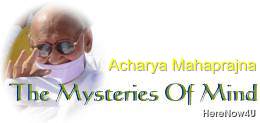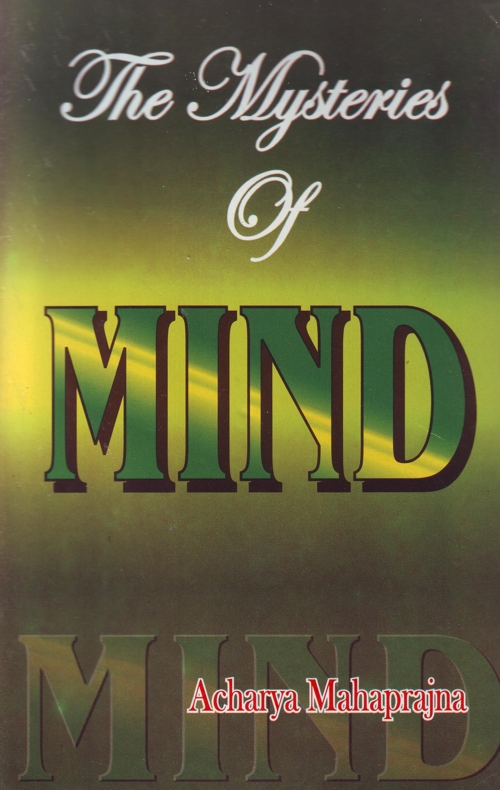
The first principal of sadhanais the pursuit of knowledge and moral conduct. Whatever attempts men make are aimed at freedom from misery. Imagination, expectation and actions also have the same aim. Spiritual exertion also aims at the same thing. Self-exertion is meaningless if it does not aim at freedom from miseries, for nobody will pursue it.
It has often been suggested that we must do something to get rid of misery instead of sitting in meditation with closed eyes. Why should we sit idle? Idleness will not procure material object without which we cannot get rid of misery. For those who say so, meditation is idleness. How can it free us from misery? It appears to be a contradiction in terms to say that we can get freedom from miseries through idleness.
It is true that productive labour alone can give freedom from wants. Only food quenches hunger. Hunger and cold are unpleasant and food and clothing alone can give freedom from them. If spiritual practitioners disown this truth, they will be called visionaries. Is not self-exertion an unprofitable endeavour? Is not spiritual life a figment of imagination?
The modern age insists that we should lead a realistic life. It does not encourage playing hide and seek with truth. It calls upon us to enjoy life. If we do not struggle to get rid of wants, we will be living in a fool's paradise. We must understand and appreciate this truth. It, therefore, seems natural to ask as to what efforts we are making to get rid of hardships and wants. Religious-minded people and those engaged in sadhana exhort us to practise religion in order that we may be free from miseries. What does self-exertion provide us with? It is incapable of fulfilling the needs of life. How can it, then, give us relief from grieves and miseries? The spiritual practitioner is a destitute. He owns no property and wealth. He does not exercise any authority and commands no power. Does he not talk with his tongue in his mouth?
These questions are raised by those who believe that only material objects are capable of giving us happiness. Spiritualists, however, fail to understand the correctness of this view. According to them material objects may cure patients of their diseases, but how can they give us happiness? For example, when one feels hungry, he eats some thing and his hunger is pacified. But does eating give him happiness? Perhaps not. Throughout our lives we go on eating some thing or the other to pacify hunger. But we confuse the pacifying of hunger with happiness. Eating some thing simply cures us of the disease of hunger.
When the mind of an addict to intoxicants becomes restless, he drinks and forgets his restlessness for the time being. But do drinks give him happiness? Till intoxication lasts, he remains unaware of the pain in his intestines. Once the effect of intoxication has subsided, he again feels the pain and again drinks. What he really gets is temporary relief from pain, which is not happiness.
Spiritualists have defined happiness as a process, which ends in joy. That which gives relief for the time being, but the consequences of which are painful, cannot be said to be capable of giving joy. Joy is a continuous process, which has no end. In other words that which gives us freedom from pain and the consequences of which are also joyous is called happiness.
Soldiers, when they win a battle, feel happy. Does their victory result in happiness? On the other band, it results in all kinds of grieves and sorrows. These grieve and sorrows are shared by the victors as well as by the vanquished. The devastation caused by wars lasts for years and years together. The effects of wars are the unhappiest. That which results in pain cannot give happiness. Let us try to understand this in the light of whether self-exertion is a source of joy.
Tensions produce miseries and excitements. To be tense means to be impulsive and vice versa. Tension saps energy. One who suffers from emotional tension becomes peevish and quarrelsome. He becomes a nuisance to society.
Mental tensions upset physical balance also. They not only produce impulsiveness but diseases also. They increase blood pressure and all its consequences.
Freedom from tensions means freedom from passions like anger, pride, deceit, greed, etc. Tensions excite passions and passions produce further tensions. This vicious circle continues indefinitely bringing in its trail all kinds of miseries.
Ancient works on medicine speak of two kinds of diseases those caused by external causes and those produced by man's own deeds. There are three causes of diseases: vata (air), pitta (bile) and kapha (phlegm). When the body sustains an injury, it is said to have been caused by external factors. A disease born of the accumulated effects of previous deeds is said to have been caused bykarma .
Then there are mental diseases. Psychotherapists speak of psychosomatic diseases, which are a combination of mental and physical diseases. Works on ancient medical science speak of adhi (mental disease) and vyadhi (physical ailments). A large number of diseases is caused by mental factors. We misunderstand them to be caused by physical weakness and germs, etc. Actually these are caused by mental causes. Psychosomatic diseases are very much complicated and have become quite widespread these days. If we want to get rid of them, let us remember the ancient aphorism "Let the soul seek truth in itself." We cannot get rid of diseases if we ourselves do not search truth in our own selves. It is necessary to remove our own ignorance.
Food also causes diseases. We are very much ignorant in matters of food. If this ignorance were removed, we get rid of a number of diseases. Moreover, there will be no mental diseases if we knew the nature of the mind and of the faculty of thinking and how to engage the mind.
Food increases as well as reduces pain. Food articles have nutritive as well as harmful properties. This is also the view of ayurvida. No food article is wholly nutritive or harmful. It is the quantity of food, which is health giving or harmful. For example, arsenic is a medicine as well as poison according to the amount of it, which we take. A lot of poison enters into our bodies with the food we consume. It is the quantity of the medicines, which produces harmful or agreeable consequences. Many things, which we eat, give us temporary relief or pleasure. Their long-term effects are, however, harmful. Ignorance in these matters causes a number of miseries. Pleasures, which the enjoyment of natural things give often, turn into pain. If this ignorance continued, it will increase the volume of our miseries. Some of us might feel that sadhana is a dry and unprofitable business. This view is the result of our associations with the objects of the material world. The truth, however, is that there can be no emancipation without getting rid of the limitations imposed upon us by natural objects. We are under the wrong impression that the bondage, which our craving for material objects imposes upon us, is a matter of joy. The general trend of thinking in the modern world favours increased production of material commodities, which alone is supposed to keep society contented and happy.
The spiritualists, on the other hand, declare that there can be no contentment and happiness without getting rid of the limitations imposed upon us by material objects. Thus there are two views. There are advocates of the enjoyment of material objects and the advocates of spiritual enjoyments.
 Acharya Mahaprajna
Acharya Mahaprajna

